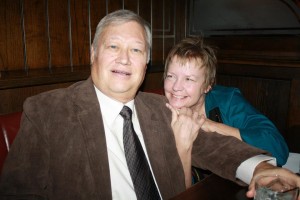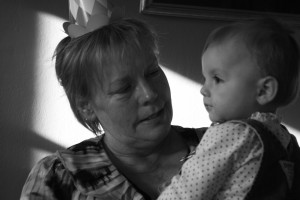Wednesday, December 12th, 2012...8:02 am
Cindy Deck: Life After Stroke (final)
Cindy, with husband, Bob
It was just a regular day for Cindy Deck in 1999 at the age of 45. She was in the kitchen when the phone rang so she picked it up. Her son, Tod, had already gotten the call so she hung up. As she was putting the phone down though, she realized that something wasn’t right. It took her a minute to put the phone down when usually it only takes a second. She knew right then that she was having a stroke but she pretended like it wasn’t happening. “I knew exactly what was going on because I saw my mother when she had her stroke, (and the same exact thing happened.)”
Her other son, Bryan, needed a shirt ironed, “I knew exactly where the iron was but when I went to go get it, it wasn’t there. Later though I found out that it was there I just couldn’t see it because your brain isn’t working right (when you have a stroke). When I turned around to tell him [Bryan] that I couldn’t find it I almost fell down. So I sat down and told him that I couldn’t find the iron and that he would need to find it and do it himself because I wasn’t feeling well.”
She then goes on to tell Bryan that if she is sick when he comes homes later in the afternoon to call the ambulance. “I told him that I was sick but I didn’t tell him that I was having a stroke.”
Her son, Bryan, said, “I obviously was concerned for my mom, but she seemed so nonchalant about the whole hospital thing so I didn’t think much of it. I didn’t realize she was having a stroke. To this day, I still feel horrible that I didn’t call 911 earlier.”
“I avoided going to the hospital until four in the morning when I could no longer lift my right leg enough to walk up the steps without falling. Then I went to brush my hair and I couldn’t. My arm didn’t know what to do. I remember when my mom had her stroke and the same thing happened to her. She was unable to brush her hair and the right side of her face drooped. The right side of my face drooped as well while I was trying to do my hair. And then the speech went. It sounded like I was wasted.”
Cindy went to the hospital and found out that before her major stroke, she had had six mini strokes before then. Her first mini stroke was when she was 38 and she had a bad earache, but had no idea it was a stroke. Because of those mini strokes, her body taught itself to depend more on the left side then the right because the strokes had affected the right side. She became ambidextrous and became more skilled with writing with her left hand. She developed skills with her left hand that she can’t even do with her right hand now.
The doctors told her that in the year to come after the first severe stroke that she would have an even more severe stoke. They also told her that she had maybe ten years to live. She has proved them wrong by living thirteen years after her stroke.
At the age of 58 now she is still recovering. After her stroke she had trouble speaking properly and thinking of the right words to say. Her speech sounded normal to everyone else after the stroke a few weeks later. She knew that her normal speech patterns were affected though, “in my brain it just didn’t feel right when I was speaking.”
“I really learned how my brained worked after the stroke. I learned how my brain filed words. I would say the wrong word accidently, but the wrong word would be the exact same amount of letters as the correct word. So my brain would take the next word in the file instead of the right one and it would happen all the time.”
She still has those difficulties, but they aren’t very noticeable unless she gets flustered when she talks about something. She forgets what she is looking for quite a lot as well. The one thing that she will not go searching for though is an iron because it freaks her out still to this day.
An example of how she recovered after her stroke was that before her stroke she was perfectly capable of getting her foot out of a hole in the yard, (this is her example of what she would do,) if that ever happened. But after the stroke if it happened there was no way she could. So she would go through the scenario again and get her foot stuck three or four times and train herself to get her foot out without any trouble. “I would think about it and try to burn a new path in my brain and it put me into recovery. And let me tell you what, I didn’t think that was helping for several years but I do now.”
She had to learn about speed again as well. You don’t think that driving in a car would affect her, but it did. “You know in the space movies and they travel through space at a million miles an hour, that’s what it felt like in a car that was going 75 mph. It was the craziest sensation of my life. But my first time in a car after the stroke my husband and I was driving to Fargo and I didn’t realize that the speed would affect me. I had to have Bob (husband,) go 45 miles per hour for the whole trip. Lets just say it took us a while to get there.” Luckily by the time they were driving back he could drive 75 mph.
Cindy now lives a pretty normal life except for the fact that she doesn’t have to work and she can do whatever she wants. She has two beautiful granddaughters that she can’t get enough of. She still notices affects of the stroke but she is doing well and loving life.
With her granddaughter, Julia


1 Comment
December 17th, 2012 at 3:22 pm
Cindy has an interesting story, Hannah, but this needed some work yet. Keep working on leads. In this case the lead should focus less on the strokes, and more on how Cindy has suffered long-term changes because of them. The anecdotes at the end are interesting, but could have been worked into the story more effectively. Some good quotes; one additional source.
You made some good progress this semester, Hannah. Keep challenging yourself with different styles of writing. See you next semester.